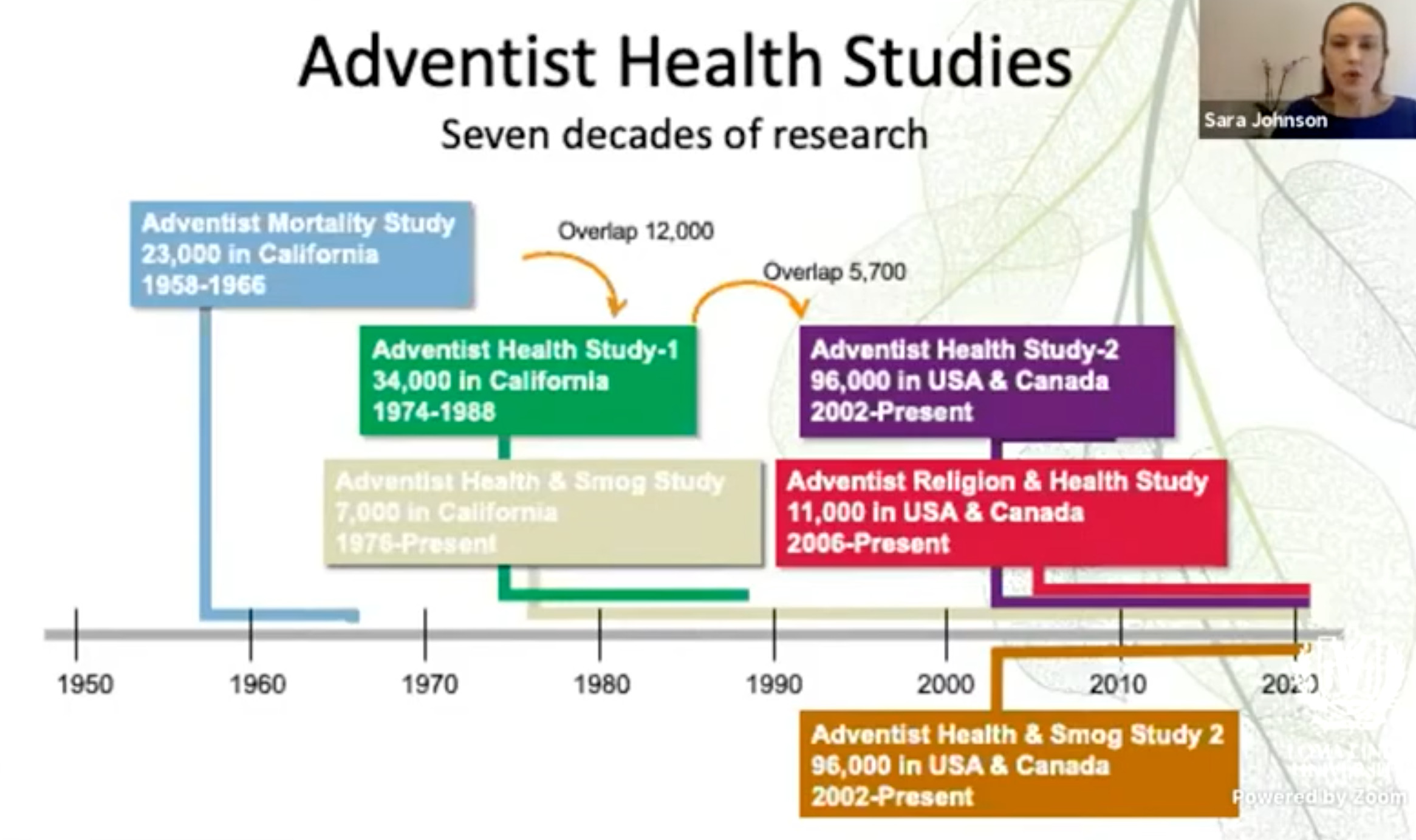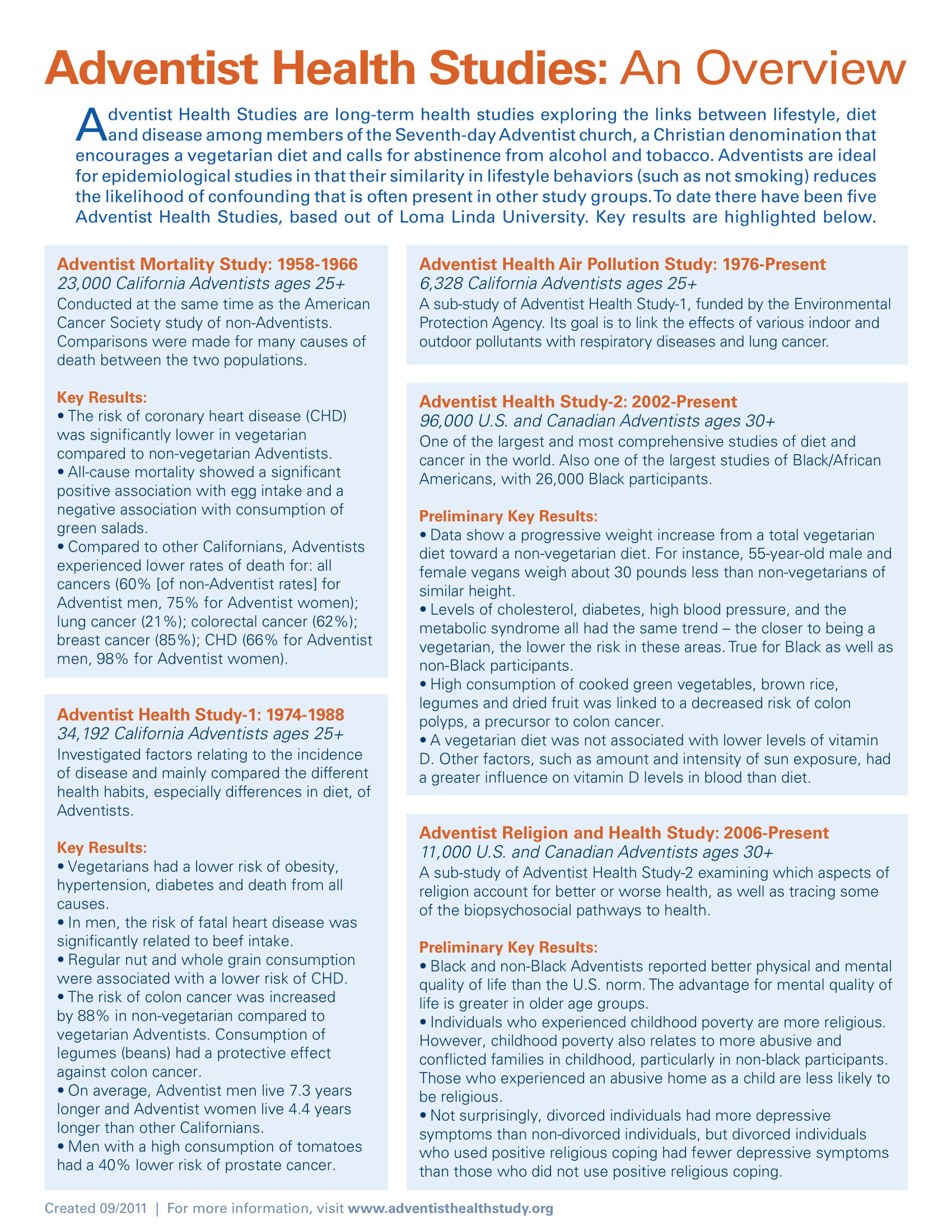What are Adventist Health Studies?

Source of slide: This lecture by Dr Sara Johnson of Loma Linda University Health. A better slide is here.
Adventist Health Studies website explains:
(1) Adventist Mortality Study: The first major study of Adventists, commenced in 1958 at Loma Linda University, has become known as the Adventist Mortality Study. This cohort study of 22,940 California-based Adventists entailed an intensive, 5-year follow-up and a more informal, 25-year follow-up. The study was conducted at the same time as the large American Cancer Society study of non-Adventists, and comparisons were made for many causes of death between the two populations.
(2) Adventist Health Study-1: The second major study was designed to determine which components of the Adventist lifestyle give protection against disease. Over the course of the study, several questionnaires were mailed to 34,198 California Adventists. In the beginning, AHS-1 was primarily a cancer investigation. In 1981, a cardiovascular component was added.
(3) Adventist Health Study-2: With 96,000 Adventist participants in the U.S. and Canada, AHS-2 is one of the largest and most comprehensive studies of diet and cancer in the world. It is also one of the largest dietary studies of Black/African Americans and will help answer why this group has a disproportionate amount of cancers and heart disease.
(4) Adventist Health Air Pollution Study: The AHSMOG Study is a substudy consisting of 6,338 California Adventists who were members of the parent AHS-1. It is believed this population provides a unique opportunity for also investigating the health effects of long-term exposure to ambient air pollutants with very little confounding (distortion) by active tobacco exposure. Since 1977, the cohort has been followed and monitored for newly diagnosed malignant neoplasms, coronary heart disease, and all-cause mortality.
(5) Adventist Religion & Health Study: ARHS is a substudy of AHS-2 consisting of 11,000 Adventist Americans who are members of the parent AHS-2. It aims to understand what specific aspects of religion, life stressors and other health behaviors account for better or worse health and trace some of the biopsychosocial pathways to health.
(2011) What have we learnt from the Adventist Health Studies?

Dr Hans Diehl is a clinical professor of Preventive Medicine at Loma Linda University and on the Board of Advisors of the American College of Lifestyle Medicine.
Dr Sara Johnson is Assistant Professor, Department of Preventive Medicine, Loma Linda University Health.
An excellent presentation that summarizes Adventist health studies till date, followed by Q&A.
Do Seventh Day Adventists live longer than others? Vegetarians Live Longer (2003) by Dr McDougall explains:
Dr Greger has an overview article: Adventist Health Studies. Do Seventh Day Adventists live longer than others?
(5 mins) Transcript. From offset 3:05 onwards in this video, Dr Greger describes the Seventh Day Adventists from Loma Linda, California:
Vegetarian diets in the Adventist Health Study 2: a review of initial published findings1, 2, 3, 4 by Michael J Orlich and Gary E Fraser, Am J Clin Nutr, 2014 Jul; 100(1) 353S-358S is a fascinating paper. Study participants were into four groups: vegan, lacto-ovo-vegetarian, pesco-vegetarian, semi-vegetarian and non-vegetarian:
Four groups (vegans, lacto-ovo-vegetarian, pesco-vegetarian and semi-vegetarian) were collectively called 'vegetarian'. This definition is different from the definition of 'vegetarian' in many parts of the world where even a small amount of fish or meat consumption makes us a 'non-vegetarian'.
What did the study find? Some summaries below. See paper for details.
Obesity: "After adjustment for age, sex, and race, mean BMIs were 24.1 for vegans, 26.1 for lactoovovegetarians, 26.0 for pescovegetarians, 27.3 for semivegetarians, and 28.3 for nonvegetarians among 73,308 participants."
Metabolic Syndrome: "Considering metabolic syndrome as a whole, the prevalence was 25.2%, 37.6%, and 39.7% for vegetarians, semivegetarians, and nonvegetarians, respectively; and in logistic regression analysis with adjustment for the same potential confounders, vegetarians had 0.44 (95% CI: 0.30, 0.64) times the odds of having metabolic syndrome as did nonvegetarians." [Diets were considered in 3 categories: vegetarian (vegan plus lactoovovegetarian), semivegetarian (pescovegetarian plus semivegetarian), and nonvegetarian.]
Hypertension: "In a logistic regression analysis that controlled for age, sex, and exercise, the adjusted ORs of having hypertension were 0.37 (95% CI: 0.19, 0.74) and 0.57 (95% CI: 0.36, 0.92) for vegans and lactoovovegetarians, respectively, compared with nonvegetarians (5). Additional adjustment for BMI (a possible causal intermediate) attenuated the results to 0.53 (95% CI: 0.25, 1.11) and 0.86 (95% CI: 0.51, 1.45), respectively."
Diabetes Mellitus: "Prevalence of type 2 diabetes was 2.9% among vegans, 3.2% among lactoovovegetarians, 4.8% among pescovegetarians, 6.1% among semivegetarians, and 7.6% among nonvegetarians (4). In logistic regression analysis, compared with nonvegetarians, the multivariate adjusted (for age, sex, ethnicity, education, income, physical activity, television watching, sleep habits, alcohol use, and BMI) ORs for prevalent type 2 diabetes were 0.51 (95% CI: 0.40, 0.66) for vegans, 0.54 (95% CI: 0.49, 0.60) for lactoovovegetarians, 0.70 (95% CI: 0.61, 0.80) for pescovegetarians, and 0.76 (95% CI: 0.65, 0.90) for semivegetarians (4)."
Osteoporosis: "Among 337 postmenopausal white women from AHS-2 evaluated for osteoporosis by broadband ultrasound attenuation of the calcaneus, the multivariate adjusted OR for osteoporosis for those consuming ≥1 servings dairy products/d compared with those consuming dairy less than twice per week was 0.38 (95% CI: 0.17, 0.86) (20). These analyses come from a logistic regression model in which both soy milk consumption and dairy product consumption were included. The OR for those consuming ≥1 1 servings soy milk/d compared with those not consuming soy milk was 0.44 (95% CI: 0.20, 0.98) (20). Thus, soy milk appeared to be associated with improved bone health to a similar degree as dairy products, suggesting that it may provide a useful alternative to dairy in certain vegetarian diets."
Cancer: "Among 69,120 participants included in the analysis, there were 2939 incident cancers. In multivariate adjusted (for age, race, family history of cancer, education, smoking, alcohol, age at menarche, pregnancies, breastfeeding, oral contraceptives, hormone replacement therapy, and menopause status) Cox proportional hazards regression analyses comparing all vegetarians combined (vegans, lactoovovegetarians, pescovegetarians, and semivegetarians) with nonvegetarians, significant reductions in risk were found for all cancers (HR: 0.92; 95% CI: 0.85, 0.99) and gastrointestinal system cancers (HR: 0.76; 95% CI: 0.63,0.90) (9). When the 4 vegetarian groups were compared separately with the nonvegetarian referent group, reduced risk was found in vegans for all cancer (HR: 0.84; 95% CI: 0.72, 0.99) and for female-specific cancers (HR: 0.66; 95% CI: 0.47, 0.92) and in lactoovovegetarians for gastrointestinal system cancers (HR: 0.75; 95% CI: 0.60, 0.92) (9)."
Mortality: "After a mean follow-up of 5.79 y (n = 73,308), Cox proportional hazards regression analysis (adjusting for age, race, sex, smoking, exercise, education, marital status, alcohol, geographic region, menopause, and hormone therapy) showed reduced all-cause mortality for all vegetarians compared with nonvegetarians (HR: 0.88; 95% CI: 0.80, 0.97). For specific dietary patterns, the HRs were 0.85 (95% CI: 0.73, 1.01) for vegans, 0.91 (95% CI: 0.82, 1.00) for lactoovovegetarians, 0.81 (95% CI: 0.69, 0.94) for pescovegetarians, and 0.92 (95% CI: 0.75, 1.13) for semivegetarians. Effects were stronger in men and less often significant in women."
A large number of papers have been written about the Seventh Day Adventists. A small sample:
Lessons from dietary studies in Adventists and questions for the future1-3 by Walter Willett, Am J Clin Nutr 2003; 78(suppl) 539S-43S (PDF copy).

 Instagram
Instagram YouTube
YouTube